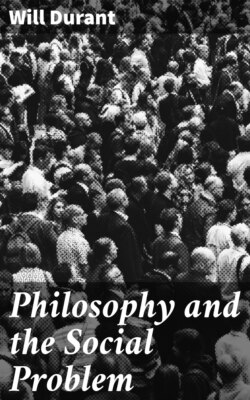Читать книгу Philosophy and the Social Problem - Уилл Дюрант - Страница 16
На сайте Литреса книга снята с продажи.
X
The Socratic Challenge
ОглавлениеBUT if individual and social health and happiness depend on intelligence rather than on “virtue,” and if the exaltation of intelligence was a cardinal element in the Athenian view of life, why did the Socratic ethic fail to save Athens from decay? And why did the supposedly intelligent Athenians hail this generous old Dr. Johnson of philosophy into court and sentence him to death?
The answer is, Because the Athenians refused to make the Socratic experiment. They were intelligent, but not intelligent enough. They could diagnose the social malady, could trace it to the decay of supernatural moral norms; but they could not find a cure, they had not the vision to see that salvation lay not in the compulsory retention of old norms, but in the forging of new and better ones, capable of withstanding the shock of questioning and trial. What they saw was chaos; and like most statesmen they longed above all things for order. They were not impressed by Socrates’ allegiance to law, his cordial admission of the individual’s obligations to the community for the advantages of social organization. They listened to the disciples: to Antisthenes, who laughed at patriotism; to Aristippus, who denounced all government; to Plato, scorner of democracy; and they attacked the master because (not to speak of pettier political reasons) it was he, they thought, who was the root of the evil. They could not see that this man was their ally and not their foe; that rescue for Athens lay in helping him rather than in sentencing him to die. And how well they could have helped him! For to preach intelligence is not enough; there remains to provide for every one the instrumentalities of intelligence. What men needed, what Athenian statesmanship might have provided, was an organization of intelligence for intelligence, an organization of all the forces of intelligence in the state in a persistent intellectual campaign. If that could not save Athens, Athens could not be saved. But the myopic leaders of the Athenian state could not see salvation in intelligence, they could only see it in hemlock. And Socrates had to die.
It will take a wise courage to accept the Socratic challenge—such courage as battle-fields and senate-chambers are not wont to show. But unless that wise courage comes to us our civilization will go as other civilizations have come and gone, “kindled and put out like a flame in the night.”
